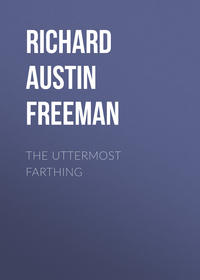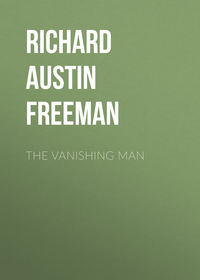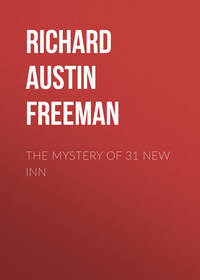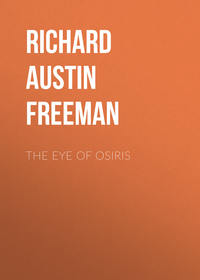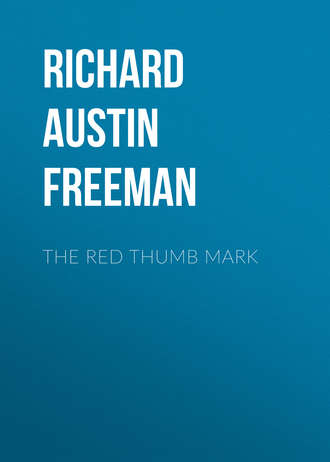 полная версия
полная версияThe Red Thumb Mark
"The evidence you shall give," sang out the usher—whereat Mrs. Hornby paused in her search and stared at him apprehensively—"to the court and jury sworn, between our Sovereign Lord the King and the prisoner at the bar shall be the truth,—"
"Certainly," said Mrs. Hornby stiffly, "I—"
"—the whole truth, and nothing but the truth; so help you God!"
He held out the Testament, which she took from him with a trembling hand and forthwith dropped with a resounding bang on to the floor of the witness-box, diving after it with such precipitancy that her bonnet jammed violently against the rail of the box.
She disappeared from view for a moment, and then rose from the depths with a purple face and her bonnet flattened and cocked over one ear like an artillery-man's forage cap.
"Kiss the Book, if you please," said the usher, suppressing a grin by an heroic effort, as Mrs. Hornby, encumbered by her purse, her handkerchief and the Testament, struggled to unfasten her bonnet-strings. She clawed frantically at her bonnet, and, having dusted the Testament with her handkerchief, kissed it tenderly and laid it on the rail of the box, whence it fell instantly on to the floor of the court.
"I am really very sorry!" exclaimed Mrs. Hornby, leaning over the rail to address the usher as he stooped to pick up the Book, and discharging on to his back a stream of coins, buttons and folded bills from her open purse; "you will think me very awkward, I'm afraid."
She mopped her face and replaced her bonnet rakishly on one side, as Anstey rose and passed a small red book across to her.
"Kindly look at that book, Mrs. Hornby."
"I'd rather not," said she, with a gesture of repugnance. "It is associated with matters of so extremely disagreeable a character—"
"Do you recognise it?"
"Do I recognise it! How can you ask me such a question when you must know—"
"Answer the question," interposed the judge. "Do you or do you not recognise the book in your hand?"
"Of course I recognise it. How could I fail to—"
"Then say so," said the judge.
"I have said so," retorted Mrs. Hornby indignantly.
The judge nodded to Anstey, who then continued—"It is called a 'Thumbograph,' I believe."
"Yes: the name 'Thumbograph' is printed on the cover, so I suppose that is what it is called."
"Will you tell us, Mrs. Hornby, how the 'Thumbograph' came into your possession?"
For one moment Mrs. Hornby stared wildly at her interrogator; then she snatched a paper from her purse, unfolded it, gazed at it with an expression of dismay, and crumpled it up in the palm of her hand.
"You are asked a question," said the judge.
"Oh! yes," said Mrs. Hornby. "The Committee of the Society—no, that is the wrong one—I mean Walter, you know—at least—"
"I beg your pardon," said Anstey, with polite gravity.
"You were speaking of the committee of some society," interposed the judge. "What society were you referring to?"
Mrs. Hornby spread out the paper and, after a glance at it, replied—
"The Society of Paralysed Idiots, your worship," whereat a rumble of suppressed laughter arose from the gallery.
"But what has that society to do with the 'Thumbograph'?" inquired the judge.
"Nothing, your worship. Nothing at all."
"Then why did you refer to it?"
"I am sure I don't know," said Mrs. Hornby, wiping her eyes with the paper and then hastily exchanging it for her handkerchief.
The judge took off his glasses and gazed at Mrs. Hornby with an expression of bewilderment. Then he turned to the counsel and said in a weary voice—"Proceed, if you please, Mr. Anstey."
"Can you tell us, Mrs. Hornby, how the 'Thumbograph' came into your possession?" said the latter in persuasive accents.
"I thought it was Walter, and so did my niece, but Walter says it was not, and he ought to know, being young and having a most excellent memory, as I had myself when I was his age, and really, you know, it can't possibly matter where I got the thing—"
"But it does matter," interrupted Anstey. "We wish particularly to know."
"If you mean that you wish to get one like it—"
"We do not," said Anstey. "We wish to know how that particular 'Thumbograph' came into your possession. Did you, for instance, buy it yourself, or was it given to you by someone?"
"Walter says I bought it myself, but I thought he gave it to me, but he says he did not, and you see—"
"Never mind what Walter says. What is your own impression?"
"Why I still think that he gave it to me, though, of course, seeing that my memory is not what it was—"
"You think that Walter gave it to you?"
"Yes, in fact I feel sure he did, and so does my niece."
"Walter is your nephew, Walter Hornby?"
"Yes, of course. I thought you knew."
"Can you recall the occasion on which the 'Thumbograph' was given to you?"
"Oh yes, quite distinctly. We had some people to dinner—some people named Colley—not the Dorsetshire Colleys, you know, although they are exceedingly nice people, as I have no doubt the other Colleys are, too, when you know them, but we don't. Well, after dinner we were a little dull and rather at a loss, because Juliet, my niece, you know, had cut her finger and couldn't play the piano excepting with the left hand, and that is so monotonous as well as fatiguing, and the Colleys are not musical, excepting Adolphus, who plays the trombone, but he hadn't got it with him, and then, fortunately, Walter came in and brought the 'Thumbograph' and took all our thumb-prints and his own as well, and we were very much amused, and Matilda Colley—that is the eldest daughter but one—said that Reuben jogged her elbow, but that was only an excuse—"
"Exactly," interrupted Anstey. "And you recollect quite clearly that your nephew Walter gave you the 'Thumbograph' on that occasion?"
"Oh, distinctly; though, you know, he is really my husband's nephew—"
"Yes. And you are sure that he took the thumb-prints?"
"Quite sure."
"And you are sure that you never saw the 'Thumbograph' before that?"
"Never. How could I? He hadn't brought it."
"Have you ever lent the 'Thumbograph' to anyone?"
"No, never. No one has ever wanted to borrow it, because, you see—"
"Has it never, at any time, gone out of your possession?"
"Oh, I wouldn't say that; in fact, I have often thought, though I hate suspecting people, and I really don't suspect anybody in particular, you know, but it certainly was very peculiar and I can't explain it in any other way. You see, I kept the 'Thumbograph' in a drawer in my writing table, and in the same drawer I used to keep my handkerchief-bag—in fact I do still, and it is there at this very moment, for in my hurry and agitation, I forgot about it until we were in the cab, and then it was too late, because Mr. Lawley—"
"Yes. You kept it in a drawer with your handkerchief-bag."
"That was what I said. Well, when Mr. Hornby was staying at Brighton he wrote to ask me to go down for a week and bring Juliet—Miss Gibson, you know—with me. So we went, and, just as we were starting, I sent Juliet to fetch my handkerchief-bag from the drawer, and I said to her, 'Perhaps we might take the thumb-book with us; it might come in useful on a wet day.' So she went, and presently she came back and said that the 'Thumbograph' was not in the drawer. Well, I was so surprised that I went back with her and looked myself, and sure enough the drawer was empty. Well, I didn't think much of it at the time, but when we came home again, as soon as we got out of the cab, I gave Juliet my handkerchief-bag to put away, and presently she came running to me in a great state of excitement. 'Why, Auntie,' she said,' the "Thumbograph" is in the drawer; somebody must have been meddling with your writing table.' I went with her to the drawer, and there, sure enough, was the 'Thumbograph.' Somebody must have taken it out and put it back while we were away."
"Who could have had access to your writing table?"
"Oh, anybody, because, you see, the drawers were never locked. We thought it must have been one of the servants."
"Had anyone been to the house during your absence?"
"No. Nobody, except, of course, my two nephews; and neither of them had touched it, because we asked them, and they both said they had not."
"Thank you." Anstey sat down, and Mrs. Hornby having given another correcting twist to her bonnet, was about to step down from the box when Sir Hector rose and bestowed upon her an intimidating stare.
"You made some reference," said he, "to a society—the Society of Paralysed Idiots, I think, whatever that may be. Now what caused you to make that reference?"
"It was a mistake; I was thinking of something else."
"I know it was a mistake. You referred to a paper that was in your hand."
"I did not refer to it, I merely looked at it. It is a letter from the Society of Paralysed Idiots. It is nothing to do with me really, you know; I don't belong to the society, or anything of that sort."
"Did you mistake that paper for some other paper?"
"Yes, I took it for a paper with some notes on it to assist my memory."
"What kind of notes?"
"Oh, just the questions I was likely to be asked."
"Were the answers that you were to give to those questions also written on the paper?"
"Of course they were. The questions would not have been any use without the answers."
"Have you been asked the questions that were written on the paper?"
"Yes; at least, some of them."
"Have you given the answers that were written down?"
"I don't think I have—in fact, I am sure I haven't, because, you see—"
"Ah! you don't think you have." Sir Hector Trumpler smiled significantly at the jury, and continued—
"Now who wrote down those questions and answers?"
"My nephew, Walter Hornby. He thought, you know—"
"Never mind what he thought. Who advised or instructed him to write them down?"
"Nobody. It was entirely his own idea, and very thoughtful of him, too, though Dr. Jervis took the paper away from me and said I must rely on my memory."
Sir Hector was evidently rather taken aback by this answer, and sat down suddenly, with a distinctly chapfallen air.
"Where is this paper on which the questions and answers are written?" asked the judge. In anticipation of this inquiry I had already handed it to Thorndyke, and had noted by the significant glance that he bestowed on me that he had not failed to observe the peculiarity in the type. Indeed the matter was presently put beyond all doubt, for he hastily passed to me a scrap of paper, on which I found, when I opened it out, that he had written "X = W.H."
As Anstey handed the rather questionable document up to the judge, I glanced at Walter Hornby and observed him to flush angrily, though he strove to appear calm and unconcerned, and the look that he directed at his aunt was very much the reverse of benevolent.
"Is this the paper?" asked the judge, passing it down to the witness.
"Yes, your worship," answered Mrs. Hornby, in a tremulous voice; whereupon the document was returned to the judge, who proceeded to compare it with his notes.
"I shall order this document to be impounded," said he sternly, after making a brief comparison. "There has been a distinct attempt to tamper with witnesses. Proceed with your case, Mr. Anstey."
There was a brief pause, during which Mrs. Hornby tottered across the court and resumed her seat, gasping with excitement and relief; then the usher called out—
"John Evelyn Thorndyke!"
"Thank God!" exclaimed Juliet, clasping her hands. "Oh! will he be able to save Reuben? Do you think he will, Dr. Jervis?"
"There is someone who thinks he will," I replied, glancing towards Polton, who, clasping in his arms the mysterious box and holding on to the microscope case, gazed at his master with a smile of ecstasy. "Polton has more faith than you have, Miss Gibson."
"Yes, the dear, faithful little man!" she rejoined. "Well, we shall know the worst very soon now, at any rate."
"The worst or the best," I said. "We are now going to hear what the defence really is."
"God grant that it may be a good defence," she exclaimed in a low voice; and I—though not ordinarily a religious man—murmured "Amen!"
CHAPTER XVI
THORNDYKE PLAYS HIS CARD
As Thorndyke took his place in the box I looked at him with a sense of unreasonable surprise, feeling that I had never before fully realised what manner of man my friend was as to his externals. I had often noted the quiet strength of his face, its infinite intelligence, its attractiveness and magnetism; but I had never before appreciated what now impressed me most: that Thorndyke was actually the handsomest man I had ever seen. He was dressed simply, his appearance unaided by the flowing gown or awe-inspiring wig, and yet his presence dominated the court. Even the judge, despite his scarlet robe and trappings of office, looked commonplace by comparison, while the jurymen, who turned to look at him, seemed like beings of an inferior order. It was not alone the distinction of the tall figure, erect and dignified, nor the power and massive composure of his face, but the actual symmetry and comeliness of the face itself that now arrested my attention; a comeliness that made it akin rather to some classic mask, wrought in the ivory-toned marble of Pentelicus, than to the eager faces that move around us in the hurry and bustle of a life at once strenuous and trivial.
"You are attached to the medical school at St. Margaret's Hospital, I believe, Dr. Thorndyke?" said Anstey.
"Yes. I am the lecturer on Medical Jurisprudence and Toxicology."
"Have you had much experience of medico-legal inquiries?"
"A great deal. I am engaged exclusively in medico-legal work."
"You heard the evidence relating to the two drops of blood found in the safe?"
"I did."
"What is your opinion as to the condition of that blood?"
"I should say there is no doubt that it had been artificially treated—probably by defibrination."
"Can you suggest any explanation of the condition of that blood?"
"I can."
"Is your explanation connected with any peculiarities in the thumb-print on the paper that was found in the safe?"
"It is."
"Have you given any attention to the subject of finger-prints?"
"Yes. A great deal of attention."
"Be good enough to examine that paper" (here the usher handed to Thorndyke the memorandum slip). "Have you seen it before?"
"Yes. I saw it at Scotland Yard."
"Did you examine it thoroughly?"
"Very thoroughly. The police officials gave me every facility and, with their permission, I took several photographs of it."
"There is a mark on that paper resembling the print of a human thumb?"
"There is."
"You have heard two expert witnesses swear that that mark was made by the left thumb of the prisoner, Reuben Hornby?"
"I have."
"Do you agree to that statement?"
"I do not."
"In your opinion, was the mark upon that paper made by the thumb of the prisoner?"
"No. I am convinced that it was not made by the thumb of Reuben Hornby."
"Do you think that it was made by the thumb of some other person?"
"No. I am of opinion that it was not made by a human thumb at all."
At this statement the judge paused for a moment, pen in hand, and stared at Thorndyke with his mouth slightly open, while the two experts looked at one another with raised eyebrows.
"By what means do you consider that the mark was produced?"
"By means of a stamp, either of indiarubber or, more probably, of chromicized gelatine."
Here Polton, who had been, by degrees, rising to an erect posture, smote his thigh a resounding thwack and chuckled aloud, a proceeding that caused all eyes, including those of the judge, to be turned on him.
"If that noise is repeated," said the judge, with a stony stare at the horrified offender—who had shrunk into the very smallest space that I have ever seen a human being occupy—"I shall cause the person who made it to be removed from the court."
"I understand, then," pursued Anstey, "that you consider the thumb-print, which has been sworn to as the prisoner's, to be a forgery?"
"Yes. It is a forgery."
"But is it possible to forge a thumb-print or a finger-print?"
"It is not only possible, but quite easy to do."
"As easy as to forge a signature, for instance?"
"Much more so, and infinitely more secure. A signature, being written with a pen, requires that the forgery should also be written with a pen, a process demanding very special skill and, after all, never resulting in an absolute facsimile. But a finger-print is a stamped impression—the finger-tip being the stamp; and it is only necessary to obtain a stamp identical in character with the finger-tip, in order to produce an impression which is an absolute facsimile, in every respect, of the original, and totally indistinguishable from it."
"Would there be no means at all of detecting the difference between a forged finger-print and the genuine original?"
"None whatever; for the reason that there would be no difference to detect."
"But you have stated, quite positively, that the thumb-print on this paper is a forgery. Now, if the forged print is indistinguishable from the original, how are you able to be certain that this particular print is a forgery?"
"I was speaking of what is possible with due care, but, obviously, a forger might, through inadvertence, fail to produce an absolute facsimile and then detection would be possible. That is what has happened in the present case. The forged print is not an absolute facsimile of the true print. There is a slight discrepancy. But, in addition to this, the paper bears intrinsic evidence that the thumb-print on it is a forgery."
"We will consider that evidence presently, Dr. Thorndyke. To return to the possibility of forging a finger-print, can you explain to us, without being too technical, by what methods it would be possible to produce such a stamp as you have referred to?"
"There are two principal methods that suggest themselves to me. The first, which is rather crude though easy to carry out, consists in taking an actual cast of the end of the finger. A mould would be made by pressing the finger into some plastic material, such as fine modelling clay or hot sealing wax, and then, by pouring a warm solution of gelatine into the mould, and allowing it to cool and solidify, a cast would be produced which would yield very perfect finger-prints. But this method would, as a rule, be useless for the purpose of the forger, as it could not, ordinarily, be carried out without the knowledge of the victim; though in the case of dead bodies and persons asleep or unconscious or under an anaesthetic, it could be practised with success, and would offer the advantage of requiring practically no technical skill or knowledge and no special appliances. The second method, which is much more efficient, and is the one, I have no doubt, that has been used in the present instance, requires more knowledge and skill.
"In the first place it is necessary to obtain possession of, or access to, a genuine finger-print. Of this finger-print a photograph is taken, or rather, a photographic negative, which for this purpose requires to be taken on a reversed plate, and the negative is put into a special printing frame, with a plate of gelatine which has been treated with potassium bichromate, and the frame is exposed to light.
"Now gelatine treated in this way—chromicized gelatine, as it is called—has a very peculiar property. Ordinary gelatine, as is well known, is easily dissolved in hot water, and chromicized gelatine is also soluble in hot water as long as it is not exposed to light; but on being exposed to light, it undergoes a change and is no longer capable of being dissolved in hot water. Now the plate of chromicized gelatine under the negative is protected from the light by the opaque parts of the negative, whereas the light passes freely through the transparent parts; but the transparent parts of the negative correspond to the black marks on the finger-print, and these correspond to the ridges on the finger. Hence it follows that the gelatine plate is acted upon by light only on the parts corresponding to the ridges; and in these parts the gelatine is rendered insoluble, while all the rest of the gelatine is soluble. The gelatine plate, which is cemented to a thin plate of metal for support, is now carefully washed with hot water, by which the soluble part of the gelatine is dissolved away leaving the insoluble part (corresponding to the ridges) standing up from the surface. Thus there is produced a facsimile in relief of the finger-print having actual ridges and furrows identical in character with the ridges and furrows of the finger-tip. If an inked roller is passed over this relief, or if the relief is pressed lightly on an inked slab, and then pressed on a sheet of paper, a finger-print will be produced which will be absolutely identical with the original, even to the little white spots which mark the orifices of the sweat glands. It will be impossible to discover any difference between the real finger-print and the counterfeit because, in fact, no difference exists."
"But surely the process you have described is a very difficult and intricate one?"
"Not at all; it is very little more difficult than ordinary carbon printing, which is practised successfully by numbers of amateurs. Moreover, such a relief as I have described—which is practically nothing more than an ordinary process block—could be produced by any photo-engraver. The process that I have described is, in all essentials, that which is used in the reproduction of pen-and-ink drawings, and any of the hundreds of workmen who are employed in that industry could make a relief-block of a finger-print, with which an undetectable forgery could be executed."
"You have asserted that the counterfeit finger-print could not be distinguished from the original. Are you prepared to furnish proof that this is the case?"
"Yes. I am prepared to execute a counterfeit of the prisoner's thumb-print in the presence of the Court."
"And do you say that such a counterfeit would be indistinguishable from the original, even by the experts?"
"I do."
Anstey turned towards the judge. "Would your lordship give your permission for a demonstration such as the witness proposes?"
"Certainly," replied the judge. "The evidence is highly material. How do you propose that the comparison should be made?" he added, addressing Thorndyke.
"I have brought, for the purpose, my lord," answered Thorndyke, "some sheets of paper, each of which is ruled into twenty numbered squares. I propose to make on ten of the squares counterfeits of the prisoner's thumb-mark, and to fill the remaining ten with real thumb-marks. I propose that the experts should then examine the paper and tell the Court which are the real thumb-prints and which are the false."
"That seems a fair and efficient test," said his lordship. "Have you any objection to offer, Sir Hector?"
Sir Hector Trumpler hastily consulted with the two experts, who were sitting in the attorney's bench, and then replied, without much enthusiasm—
"We have no objection to offer, my lord."
"Then, in that case, I shall direct the expert witnesses to withdraw from the court while the prints are being made."
In obedience to the judge's order, Mr. Singleton and his colleague rose and left the court with evident reluctance, while Thorndyke took from a small portfolio three sheets of paper which he handed up to the judge.
"If your lordship," said he, "will make marks in ten of the squares on two of these sheets, one can be given to the jury and one retained by your lordship to check the third sheet when the prints are made on it."
"That is an excellent plan," said the judge; "and, as the information is for myself and the jury, it would be better if you came up and performed the actual stamping on my table in the presence of the foreman of the jury and the counsel for the prosecution and defence."
In accordance with the judge's direction Thorndyke stepped up on the dais, and Anstey, as he rose to follow, leaned over towards me.
"You and Polton had better go up too," said he: "Thorndyke will want your assistance, and you may as well see the fun. I will explain to his lordship."


